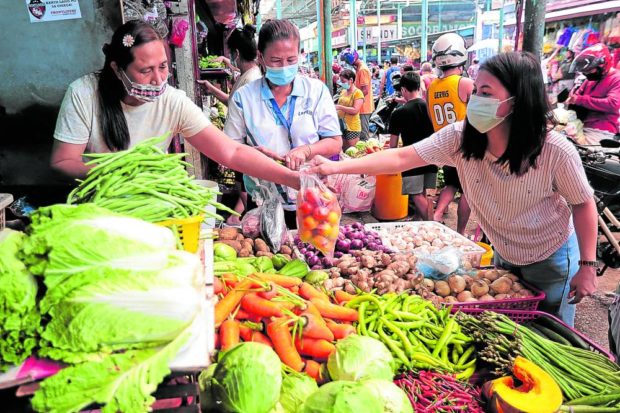PH inflation seen further heating up to 7.3% in October
Inflation in the Philippines is expected to heat up further to 7.3 percent in October, no thanks to heavy rains that ravaged farms as well as the worst-yet weakening of the Philippine peso during the month.
“Philippine inflation will likely move past 7 percent after food prices rose sharply due to crop damage from recent typhoons,” ING Bank said.
The Dutch Bank added that even higher inflation is likewise expected in neighboring countries, including Indonesia due to rising fuel prices and South Korea due to rising utility rates and a similarly weak local currency.
Over the past five weeks, five tropical cyclones entered the Philippine area of responsibility, including Supertyphoon “Karding” that wiped out about P3.2 billion worth of crops, livestock and other goods from the country’s gross domestic product.
For Goldman Sachs, October inflation is expected at 7.1 percent because of higher prices of fresh vegetables and also due the weaker peso.
Article continues after this advertisementCorrection
In October, the peso hit its record weakest position of 59:$1 four times—Oct. 3, 10, 13 and 17. However, the peso ended the month at 57:97:$1 as monetary authorities prevented the local currency from weakening further while the US dollar went through downward correction.
Article continues after this advertisementRobert Dan Roces, chief economist at Security Bank Corp., also expects October inflation at 7.1 percent, but acknowledged the possibility that it could be as high as 7.3 percent or as low as 6.9 percent—the same as the readout for September.
“The October print may be the peak in the current run-up of consumer prices,” Roces said. “However, inflation may be slow to recede and likely fall back into the 2 to 4 percent target range of the Bangko Sentral ng Pilipinas only by mid-2023,” he said.
Roces added that the biggest contributors to inflation in October were food items, utilities and transportation.
According to the World Bank, the depreciation of currencies around the world is driving up food and fuel prices, which could prolong pressures that quicken inflation in most developing economies such as the Philippines.
Ayhan Kose, director of the World Bank’s Prospects Group, said policymakers in emerging markets and developing economies have limited room to manage the most pronounced global inflation cycle in decades.
“They need to carefully calibrate monetary and fiscal policies, clearly communicate their plans, and get ready for a period of even higher volatility in global financial and commodity markets,” Kose said. INQ
